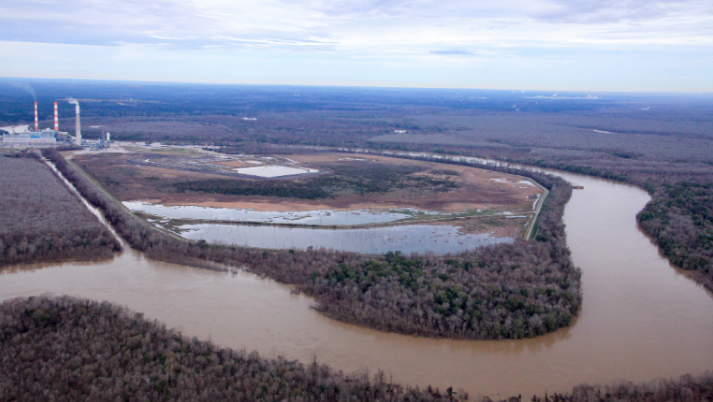By Hank Black
All of Alabama Power Company’s open coal ash ponds sit within five feet of an aquifer, or groundwater reservoir, in violation of federal standards, recent company filings confirm.
In the wake of the reports, environmental groups are keeping the pressure on the state’s public utilities to move toxin-laden coal ash away from waters next to power plants.
Under the 2015 Coal Combustion Residuals Rule, the locations of all coal ash basins in the nation must meet federal standards for distance from aquifers and wetlands. The basins also must conform to stability, seismic and fault restrictions.
Alabama Power Company has posted results from what is called “location restriction demonstrations” on its website for most of its facilities.
Alabama Power spokesman Michael Sznajderman Tuesday confirmed tests showed there is not a minimum five feet of separation from the company’s ash ponds to groundwater aquifers.
“Alabama Power has evaluated conditions at and around our facilities and we have no indication of any effect on any source of drinking water,” he says.
Groundwater testing by the utilities posted earlier this year showed groundwater pollution from coal ash occurring at all coal ash impoundments. The utilities were required to perform additional tests, and results are expected soon.
“Testing shows the company’s ash ponds are stable, there are no concerns with potential seismic issues, the ponds are not in a wetland, and the terrain is not conducive to fault movement or sinkholes,” Sznajderman says.
The results were certified by a professional engineer of Southern Company, Alabama Power’s parent organization.
Although Alabama Power’s Plant Barry is near the Mobile-Tensaw River Delta wetlands, federal regulations exclude treatment ponds that are designed to meet requirements of the national Clean Water Act and the administrative code of the Alabama Department of Environmental Management.
Some Alabama Power facilities are in seismic areas and areas subject to sinkholes, however, the company’s filings certify that it has taken allowable measures to guard against disruption of the ash ponds.
The utility previously announced it expects all its facilities to stop receiving additional ash by the end of March, at which point the utility will treat and remove water from the ash in its basins to reduce their size and cover them to keep rainwater out, a process called cap-in-place.
Alabama Power’s ash pond at Plant Gadsden already has been capped.
Tennessee Valley Authority published results for most of its operations in mid-November. It did not conduct testing on some of its sites because it already has plans to close them before April. Four of its sites met the distance requirement, but the coal ash pond at its Paradise plant violated the federal rule.
PowerSouth Energy Cooperative, the state’s other electricity producer, did not answer BirminghamWatch’s email request to provide filings for its Lowman unit. The testing has been performed, according to a slide show on its website.
Environmental Groups Want Ponds Moved
Environmental advocacy groups repeatedly have insisted utilities’ ash be excavated and moved away from waterways to landfills with impervious liners top and bottom. Either method is allowable under rules of the Alabama Department of Environmental Management.
In a Nov. 26 news release from the Southern Environmental Law Center and Mobile Baykeeper, SELC’s Keith Johnston said, “to leave the ash in place forever does nothing to protect Alabama communities … however the utilities can still make a decision to move these sources of contamination.”
Alabama Power pushed back, saying, “It is unfortunate that certain organizations continue to push out information intended to scare Alabamians. Alabama Power’s focus is safely and permanently closing all ash ponds and communicating our progress to customers and stakeholders.”

